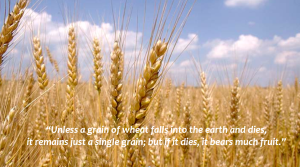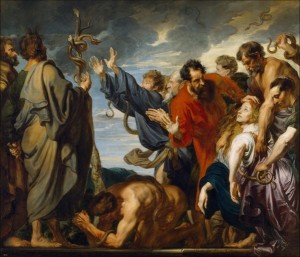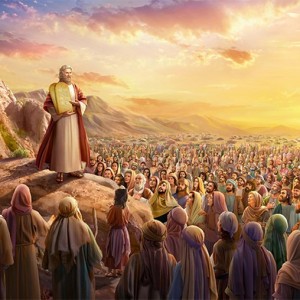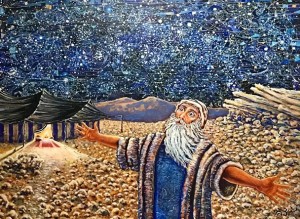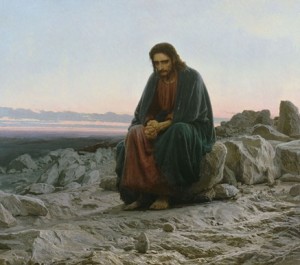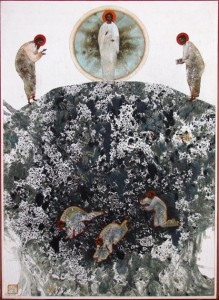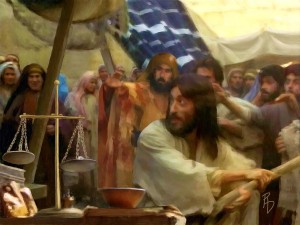
Artist Ric Darrell, based on Zeffirelli film,
Jesus of Nazareth
“Making a whip of cords, Jesus drove them out of the temple… He told them, ‘Stop making my Father’s house a marketplace!’”
– John 2:15-16
Pilgrims on the way,
Misplaced religious zeal has done much, through the ages, to dishonor the name Christian: The Crusades; the Inquisition; the witch trials; the religiously sanctioned system of racial caste; century upon century of wars in which confessors of Christ drew swords or fired weapons at one another across battle lines or, with weapons as instruments of “Manifest Destiny,” seized—as gifts from God’s hands—the lands and resources that had sustained New World peoples for thousands of years. Such zeal continues, newly resurgent, in our own time—especially of the quasi-religious/political variety, as the Capitol insurrection of January 6 attests. All too often in the long history of humanity, being zealous has translated into being dangerous and destructive.
So we have good reason to be cautious when, partway through Lent, we come face to face with acts of zeal on the part Jesus himself. Jesus goes to a Sacred Place, and finds instead a market place. He sees how love of God has been replaced by a system of commerce makes relationship with God a transactional affair. His reaction is immediate and visceral: Jesus is outraged Filled with passionate zeal, he acts—tables fly, money scatters, and out comes a whip to drive the whole operation—man and beast—out of God’s House. STOP MAKING MY FATHER’S HOUSE A MARKET-PLACE! he shouts.
Zeal is not a word we tend to want to associate with Jesus, much less our Lutheran selves. Zeal may be OK for Pentecostals, or Southern Baptists. But Lutherans? “Dogged”—that’s a good word; or “staunch.” Staunch Lutherans. And maybe, on occasion, like our namesake Brother Martin, “bold.” But we steer clear of “zeal,” don’t we? And after the long history of zealous religion gone bad, we have a right—an obligation—to be more than a little cautious, don’t we? Besides, living under the pressure of a pandemic, it seems that we have to hedge a bit on everything we do, even if that means chastening our faith’s bold feathers and clipping its sharp claws.
Here’s the question then: Is there any room in today’s church for the kind of ZEAL we see in Jesus, the kind of HOLY HAVOC that calls systems of injustice what they are and seeks to overturn them? Is there a way to be zealous that doesn’t involve dehumanizing the other? That doesn’t involve attacking or denigrating? A way that doesn’t depend on violence to achieve its ends?
Nobel laureate (and Lutheran) Leymah Bgowee, who with other Liberian women—Christian and Muslim—started a movement that ultimately brought peace in their country after fifteen years of brutal civil war and the deaths of 200,000 people, tells her story in her memoir, Mighty Be our Powers.[1] This is what she says:
“During the years that civil war tore us apart, foreign reporters often came to document the nightmare. [Their accounts] are all about the power of destruction [and inevitably focus on men.] In the traditional telling of war stories, women are always in the background. Our suffering is just a sidebar to the main tale… During the war in Liberia, almost no one reported the other reality—[the reality] of women’s lives.
- How we hid our husbands and sons from soldiers looking to recruit or kill them.
- How, in the midst of chaos, we walked miles to find food and water for our families.
- How we kept life going so that there would be something left to build on when peace returned.
- And how we created strength in sisterhood, and spoke out for peace on behalf of all Liberians.
“This [story I tell] is not a traditional war story. It is about an army of women in white standing up when no one else would—unafraid, because the worst things imaginable had already happened to us. It is about how we found the moral clarity, persistence and bravery to raise our voices against war and restore sanity to our land.”[2]
Read her story and then ask yourself, is not the zeal of Leymah Bgowee and the women in white who stared down unjust, self-serving war lords, who PRAYED THE DEVIL BACK TO HELL,[3] is not their zeal the very kind of zeal we find in our gospel? The kind our world needs in order to get to a place it’s seldom if ever been?
Coming in the heart of Lent, Women’s History Month is an excellent time for becoming better acquainted with the lives and stories of women of faith who, like Leymah Bgowee, Harriet Tubman, Sojourner Truth, Dorothy Day, Mother Teresa, Fannie Lou Hammer, Ella Baker, and on and on, lived out their calling with a zeal that was life-giving instead of life-taking. You have names of your own to add to that list. Some whom you know personally. Some whom you aspire to know—and emulate. According to the gospels, Jesus’ engagement in holy havoc set in motion his adversaries’ desire to be rid of him permanently. What they couldn’t see is how the zeal that ultimately led to his death was a necessary step in midwifing God’s dream to birth. What no one could see is that his death was not the final act but rather the prelude to what would take place “on the third day.”
With you on the Way,
Pastor Erik
[1] Mighty Be our Powers (New York: Beast Books, 2011)
[2] Ibid. Prologue, p. ix, x.
[3] A film by this title tells the story of the Liberian women for peace who successfully pressured their leaders to engage in peace talks. Bill Moyers Journal featured Leymah Bgowee and the film’s producer Abigail Disney in an interview on June 19, 2009. Find it @ http://www.pbs.org/moyers/journal/06192009/watch.html The film Pray the Devil Back to Hell can be purchased through this website: http://www.forkfilmsdvdsales.com/


